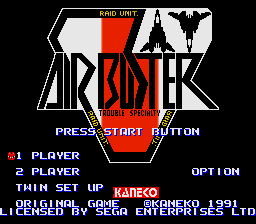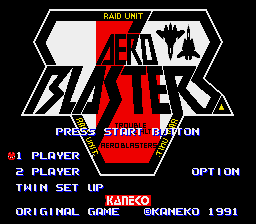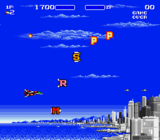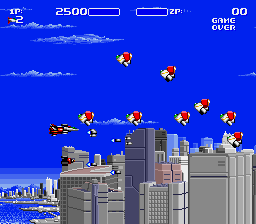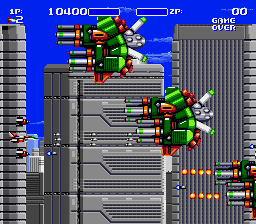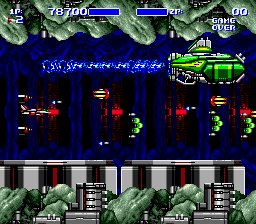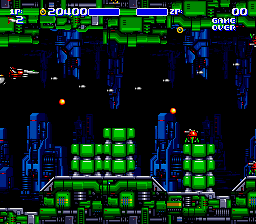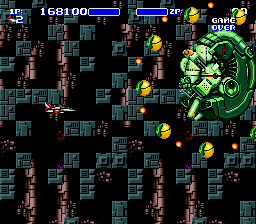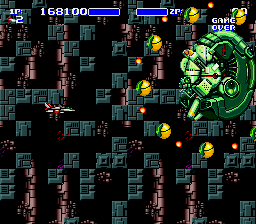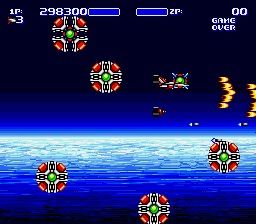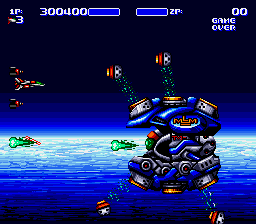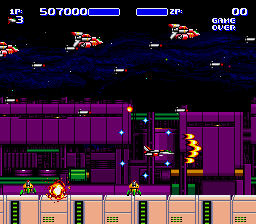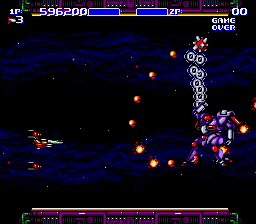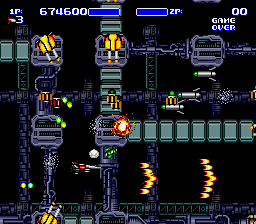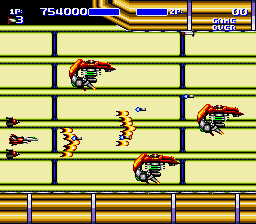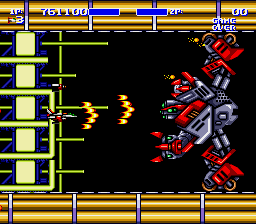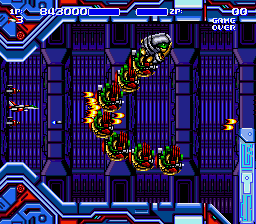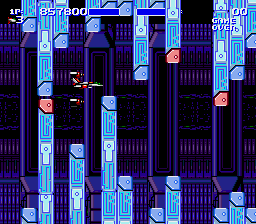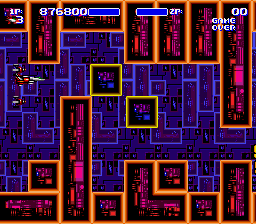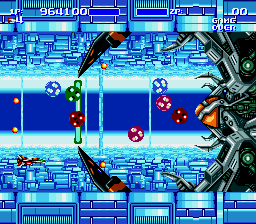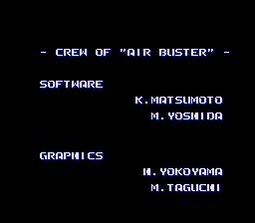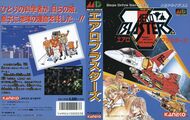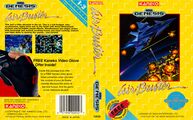Difference between revisions of "Air Buster: Trouble Specialty Raid Unit"
From Sega Retro
| Line 37: | Line 37: | ||
The game is a horizontally scrolling shoot-'em-up where players take control of Buster Fighter starships in their efforts to destroy a mysterious mechanical fortress orbiting the planet. The fighters can equip one of seven supplementary weapons in addition to their normal shot. Two players can play cooperatively by choosing the Twin Set Up option from the title screen. | The game is a horizontally scrolling shoot-'em-up where players take control of Buster Fighter starships in their efforts to destroy a mysterious mechanical fortress orbiting the planet. The fighters can equip one of seven supplementary weapons in addition to their normal shot. Two players can play cooperatively by choosing the Twin Set Up option from the title screen. | ||
| − | The ship moves in any direction with the D-Pad. In the outer space stages, the ship continues to drift in the direction it was last moved because of the lack of gravity. The ship fires its normal shot with {{B}}, which can be held for rapid-fire. The power of the normal shot can be upgraded multiple times by collecting power-ups. The ship is also equipped with a screen-clearing special weapon called the Buster Flash, which is used by holding {{C}} to charge | + | The ship moves in any direction with the D-Pad. In the outer space stages, the ship continues to drift in the direction it was last moved because of the lack of gravity. The ship fires its normal shot with {{B}}, which can be held for rapid-fire. The power of the normal shot can be upgraded multiple times by collecting power-ups. The ship is also equipped with a screen-clearing special weapon called the Buster Flash, which is used by holding {{C}} to charge the Blaster Meter, then releasing the button when the bar is full. The player must briefly wait for the weapon to cool down before it can be charged again. The player can also charge the bar by holding {{A}}, which simultaneously fires the normal shot. |
The ship is downed when it is hit by enemy fire or collides with an enemy or terrain. It respawns in place as long as the player has an extra life remaining, at baseline weapon strength and without any supplementary weapon. The game ends if the player runs out of lives but can be continued as long as there are credits remaining. In two-player games, both players have separate lives but share credits. The game has four difficulty levels (Easy, Normal, Hard, and Hardest). Players can choose the number of initial lives and credits from the options before starting the game. | The ship is downed when it is hit by enemy fire or collides with an enemy or terrain. It respawns in place as long as the player has an extra life remaining, at baseline weapon strength and without any supplementary weapon. The game ends if the player runs out of lives but can be continued as long as there are credits remaining. In two-player games, both players have separate lives but share credits. The game has four difficulty levels (Easy, Normal, Hard, and Hardest). Players can choose the number of initial lives and credits from the options before starting the game. | ||
Revision as of 22:12, 28 July 2024
| ||||||||||||||||||||
| Air Buster: Trouble Specialty Raid Unit | ||||||||||||||||||||
|---|---|---|---|---|---|---|---|---|---|---|---|---|---|---|---|---|---|---|---|---|
| System(s): Sega Mega Drive | ||||||||||||||||||||
| Publisher: Kaneko[1] (JP) Kaneko USA (US) | ||||||||||||||||||||
| Developer: Inter State[1] | ||||||||||||||||||||
| Supporting companies: T's Music[1] (audio) | ||||||||||||||||||||
| Original system(s): Arcade boards | ||||||||||||||||||||
| Developer(s) of original games: Kaneko | ||||||||||||||||||||
| Sound driver: SMPS Z80 | ||||||||||||||||||||
| Genre: Shooting[2] | ||||||||||||||||||||
| Number of players: 1-2 | ||||||||||||||||||||
| ||||||||||||||||||||
|
Air Buster: Trouble Specialty Raid Unit is a 1990 arcade shoot-'em-up by Kaneko which was subsequently ported to the PC Engine in 1990 and to the Sega Mega Drive in 1991. The PC Engine and Mega Drive ports were renamed Aero Blasters: Trouble Specialty Raid Unit (エアロブラスターズ) in Japan.
Contents
Story
In the year 2030, Earth is suddenly attacked by the Mega Load Masters. Charles K. Takeda had foreseen this event and prepared for it by moving his family to an island in the Pacific and developing a futuristic weapon called the "Buster System," which is capable of deconstructing matter by amplifying human mind waves. He created two aircraft armed with Buster Systems, Buster 1 and Buster 2, and trained his children, Holly and Mike, to pilot them.
Gameplay
The game is a horizontally scrolling shoot-'em-up where players take control of Buster Fighter starships in their efforts to destroy a mysterious mechanical fortress orbiting the planet. The fighters can equip one of seven supplementary weapons in addition to their normal shot. Two players can play cooperatively by choosing the Twin Set Up option from the title screen.
The ship moves in any direction with the D-Pad. In the outer space stages, the ship continues to drift in the direction it was last moved because of the lack of gravity. The ship fires its normal shot with ![]() , which can be held for rapid-fire. The power of the normal shot can be upgraded multiple times by collecting power-ups. The ship is also equipped with a screen-clearing special weapon called the Buster Flash, which is used by holding
, which can be held for rapid-fire. The power of the normal shot can be upgraded multiple times by collecting power-ups. The ship is also equipped with a screen-clearing special weapon called the Buster Flash, which is used by holding ![]() to charge the Blaster Meter, then releasing the button when the bar is full. The player must briefly wait for the weapon to cool down before it can be charged again. The player can also charge the bar by holding
to charge the Blaster Meter, then releasing the button when the bar is full. The player must briefly wait for the weapon to cool down before it can be charged again. The player can also charge the bar by holding ![]() , which simultaneously fires the normal shot.
, which simultaneously fires the normal shot.
The ship is downed when it is hit by enemy fire or collides with an enemy or terrain. It respawns in place as long as the player has an extra life remaining, at baseline weapon strength and without any supplementary weapon. The game ends if the player runs out of lives but can be continued as long as there are credits remaining. In two-player games, both players have separate lives but share credits. The game has four difficulty levels (Easy, Normal, Hard, and Hardest). Players can choose the number of initial lives and credits from the options before starting the game.
Items
| Gun Diche (ガンデッチー) | |
|---|---|
| Destroy to release a cache of items, which spread out in a fan. | |
| Normal Shot Power-Up | |
| Upgrades the power of the Buster's normal shot, up to 8 times. | |
| Side Fighter | |
| Equips the Side Fighter weapon, which furnishes the ship with two options that follow it and provide support fire. | |
| Bumper | |
| Equips the Bumper weapon, which is a pair of shields above and below the ship that protect it from damage from both enemies and colliding with terrain. Bumpers can destroy enemies on contact. | |
| 6-Direction Shot | |
| Equips the 6-Direction Shot weapon, which fires in six directions in a circle out from the ship. | |
| Guided Missile 1 (Red) | |
| Equips the Guided Missile 1 (Red) weapon, which shoots red homing missiles straight ahead. | |
| Guided Missile 2 (Green) | |
| Equips the Guided Missile 2 (Green) weapon, which shoots green homing missiles that scatter. | |
| Rear Shot | |
| Equips the Rear Shot weapon, which fires two diagonal shots from behind the ship. | |
| Revolving Gun Turret | |
| Equips the Revolving Gun Turret weapon, which is a drone that trails the ship and rotates counterclockwise while firing. | |
| Bonus | |
| Awards bonus points. | |
| 1-Up | |
| Gives the player an extra life. |
Stages
| Seaside Front | |
|---|---|
| Mechanized Cave | |
| Scramble! | |
| Out of Gravity | |
| The Borderline | |
| Death Circus | |
Versions
Both home ports are pretty faithful, with the Mega Drive one being closer to the original game than the PC Engine version. The Mega Drive port runs full-screen, features more detailed graphics, keeps most of the arcade version's parallax, and has better sound effects. The PC Engine port features a slightly expanded ending.
Localised names
| Language | Localised Name | English Translation |
|---|---|---|
| English (US) | Air Buster | Air Buster |
| Japanese | エアロブラスターズ | Aero Blasters |
Production credits
- Software: K.Matsumoto, M.Yoshida
- Graphics: H.Yokoyama, M.Taguchi
- Music Compose: T.Watanabe
- Sound Operate: K.Komatsu, T.Ohkuma
- Test Game: Inter State Staff
- Special Thanks: Kaneko Arcade Staff
- Total Coordinate: Y.Hojo
- General Producer: A.Uto
- "Air Buster" ("Aero Blasters" in the Japanese version)
- ©1991 Kaneko Co., Ltd.
- All Rights Reserved
Digital manuals
Magazine articles
- Main article: Air Buster: Trouble Specialty Raid Unit/Magazine articles.
Promotional material
- Main article: Air Buster: Trouble Specialty Raid Unit/Promotional material.
Physical scans
| Sega Retro Average | |||||||||||||||||||||||||||||||||||||||||||||||||||||||||||||||||||||||||||||||||||||||||||||||||||||||||||||||||||||||||||||||||
|---|---|---|---|---|---|---|---|---|---|---|---|---|---|---|---|---|---|---|---|---|---|---|---|---|---|---|---|---|---|---|---|---|---|---|---|---|---|---|---|---|---|---|---|---|---|---|---|---|---|---|---|---|---|---|---|---|---|---|---|---|---|---|---|---|---|---|---|---|---|---|---|---|---|---|---|---|---|---|---|---|---|---|---|---|---|---|---|---|---|---|---|---|---|---|---|---|---|---|---|---|---|---|---|---|---|---|---|---|---|---|---|---|---|---|---|---|---|---|---|---|---|---|---|---|---|---|---|---|---|
|
| 73 | |
|---|---|
| Based on 25 reviews | |
Technical information
References
NEC Retro has more information related to Aero Blasters
|
- ↑ 1.0 1.1 1.2 http://gdri.smspower.org/wiki/index.php/Inter_State
- ↑ 2.0 2.1 https://sega.jp/history/hard/megadrive/software_l.html (Wayback Machine: 2020-07-02 23:21)
- ↑ File:AirBuster MD JP Box.jpg
- ↑ Electronic Gaming Monthly, "March 1991" (US; 1991-xx-xx), page 58
- ↑ https://www.amusement-center.com/project/egg/game/?product_id=1211
- ↑ File:Air Buster MD credits.pdf
- ↑ 1700 igr dlya Sega, "" (RU; 2001-xx-xx), page 28
- ↑ 1700 igr dlya Sega, "" (RU; 2001-xx-xx), page 14
- ↑ ACE, "June 1991" (UK; 1991-05-08), page 72
- ↑ Aktueller Software Markt, "Mai 1991" (DE; 1991-04-26), page 128
- ↑ Beep! MegaDrive, "February 1991" (JP; 1991-01-08), page 31
- ↑ The Complete Guide to Sega, "" (UK; 1991-05-xx), page 100
- ↑ Console XS, "June/July 1992" (UK; 1992-04-23), page 126
- ↑ Computer & Video Games, "April 1991" (UK; 1991-03-16), page 79
- ↑ Mean Machines: The Essential Sega Guide, "" (UK; 1993-11-18), page 16
- ↑ Hippon Super, "February 1991" (JP; 1991-01-07), page 41
- ↑ Joystick, "Avril 1991" (FR; 1991-0x-xx), page 106
- ↑ Sega Mega Drive Advanced Gaming, "January 1993" (UK; 199x-xx-xx), page 90
- ↑ Mega Drive Fan, "April 1991" (JP; 1991-03-08), page 83
- ↑ Mega, "June 1993" (UK; 1993-05-20), page 85
- ↑ MegaTech, "Xmas 1991" (UK; 1991-12-06), page 76
- ↑ Mean Machines, "March 1991" (UK; 1991-03-01), page 40
- ↑ Mean Machines Sega, "October 1992" (UK; 1992-09-xx), page 137
- ↑ Power Play, "2/91" (DE; 1991-01-18), page 150
- ↑ Power Play, "6/91" (DE; 1991-05-10), page 136
- ↑ Raze, "May 1991" (UK; 1991-03-28), page 66
- ↑ Sega Power, "October 1991" (UK; 1991-09-05), page 52
- ↑ Sega Pro, "November 1991" (UK; 1991-xx-xx), page 18
- ↑ Sega Pro, "April 1993" (UK; 1993-03-11), page 64
- ↑ Sega Saturn Magazine, "September 1995" (JP; 1995-08-08), page 86
- ↑ Tricks 16 bit, "Tricks Sega Gold 800 igr" (RU; 1998-03-20), page 6
| Air Buster: Trouble Specialty Raid Unit | |
|---|---|
|
Main page | Comparisons | Hidden content | Magazine articles | Reception | Promotional material | Region coding | Technical information | Bootlegs | |
